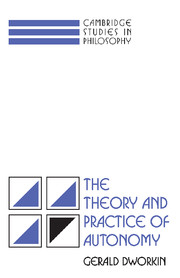Book contents
- Frontmatter
- Contents
- Preface
- Acknowledgments
- PART I THEORY
- PART II PRACTICE
- 6 Consent, representation, and proxy consent
- 7 Autonomy and informed consent
- 8 Paternalism: some second thoughts
- 9 The serpent beguiled me and I did eat: entrapment and the creation of crime
- 10 Behavior control and design
- Epilogue
- Bibliography
- Index
7 - Autonomy and informed consent
Published online by Cambridge University Press: 05 June 2012
- Frontmatter
- Contents
- Preface
- Acknowledgments
- PART I THEORY
- PART II PRACTICE
- 6 Consent, representation, and proxy consent
- 7 Autonomy and informed consent
- 8 Paternalism: some second thoughts
- 9 The serpent beguiled me and I did eat: entrapment and the creation of crime
- 10 Behavior control and design
- Epilogue
- Bibliography
- Index
Summary
“Why do you assume you have the right to decide for someone else? Don't you agree it's a terrifying right, one that rarely leads to good? You should be careful. No one's entitled to it, not even doctors.”
“But doctors are entitled to the right – doctors above all,” exclaimed Dontsova with deep conviction. By now she was really angry. “Without that right there'd be no such thing as medicine!”
Solzhenitsyn, Cancer WardThe slave doctor prescribes what mere experience suggests – and when he has given his orders, like a tyrant, he rushes off. But the other doctor, who is a freeman, attends and practices upon freemen – he enters into a discourse with the patient and with his friends – and he will not prescribe for him until he has first convinced him: at last, when he has brought the patient more and more under his persuasive influences and set him on the road to health, he attempts to effect a cure.
Plato, The LawsIn ethics, as in the law, there is often agreement concerning what to do in a particular case, or about the importance of a moral principle, co-existing with disagreement about why we should act in a certain manner, or on the nature or basis of the moral principle. Similarly, moral theories may agree about specific cases of lying while giving different accounts of why a lie is or is not justified.
- Type
- Chapter
- Information
- The Theory and Practice of Autonomy , pp. 100 - 120Publisher: Cambridge University PressPrint publication year: 1988
- 5
- Cited by

